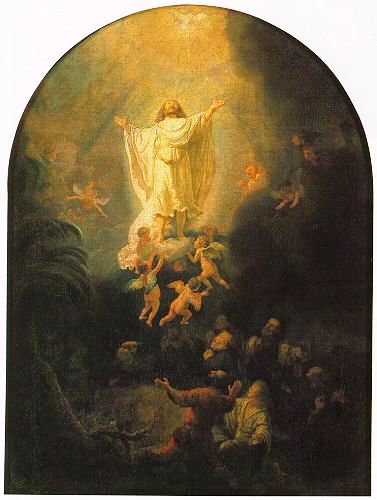Ascension
|
Forty days after Easter we celebrate the Ascension, when the Logos purified becomes God. At the beginning of the fifth century C.E., St. Augustine says that the Feast of the Ascension is of Apostolic origin, and indicates its universal observance before his time.
The Feast celebrates the Ascension of Jesus into heaven, which is described in the Acts of the Apostles 1:6-11: "When they therefore were come together, they asked of him, saying, Lord, wilt thou at this time restore again the kingdom to Israel? And he said unto them, It is not for you to know the times or the seasons, which the Father hath put in his own power. But ye shall receive power, after that the Holy Ghost is come upon you: and ye shall be witnesses unto me both in Jerusalem, and in all Judaea, and in Samaria, and unto the uttermost part of the earth. And when he had spoken these things, while they beheld, he was taken up; and a cloud received him out of their sight. And while they looked steadfastly toward heaven as he went up, behold, two men stood by them in white apparel; Which also said, Ye men of Galilee, why stand ye gazing up into heaven? This same Jesus, which is taken up from you into heaven, shall so come in like manner as ye have seen him go into heaven." |
The Gnostic book Pistis Sophia gives another description of the Ascension:
“So it was that when the Light-Power came down on Jesus it gradually surrounded him altogether. Then Jesus ascended on high, shining most exceedingly with an unmeasured light; and the disciples were gazing after him, not one of them speaking until he went up to heaven, but they were all in great silence. When Jesus went up to heaven, after three hours, all the powers of the heavens trembled, and the whole earth with those who dwell thereon shook until the ninth hour of the next day. Then were all the powers of the height singing hymns to the Inmost of the Inmosts so that the whole world heard their ceaseless voices. But the disciples sat close together, being afraid. Then the heavens opened, and they saw Jesus coming down, shining most exceedingly, for he shone more than at the time he had gone up to the Heavens, so that no man of earth can speak of the light that was on him.”
Stories of Ascension to the heavens were common in the ancient world and represented the deification of an exceptionally righteous person. Krishna, Buddha, Zoroaster, Adonis, Hercules, Romulus, and even the emperor Augustus were said to have ascended to Heaven. Among the Jews, Enoch, Ezra, Baruch, Levi, Elijah, Moses, and the children of Job were all said to have ascended. Ascent to the heavens was listed in the preface of the Sefer ha-Razim (The Book of Secrets) as one of the things to be learned from the book (along with how to perform miracles and general wisdom). It states as a goal:
"To know what is necessary for ascent to the heavens; to travel through all that is in the seven heavens, to behold all the signs of the zodiac, and . . . sun . . . moon and (stars); to learn the names of the guards of each firmament and their work and how they manage everything, and what are the names of their servants, and what libations are to be made to them, and what is the time [in which each of them] will consent to do whatever is asked by anyone who approaches them in purity."
In short, it is by observing the cosmos, by learning, by giving offerings, and by purity that inner Christ ascends to the heavens, which is the deification of the soul.
Amen.
